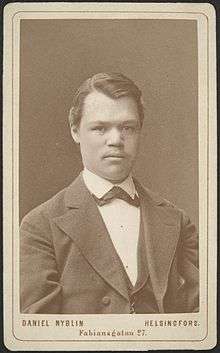Ragnar Hult

Ragnar Hult in the early 1880s.
Ragnar Hult (4 March 1857 – 25 September 1899) was a Finnish botanist and plant geographer. He was a forerunner in developing a methodology for vegetation survey. He emphasized the physiognomy of vegetation and paid less attention to its ecology. His ideas were much-followed in Sweden, making him the real father of the "Uppsala school" in plant sociology.[1]
Ragnar Hult was the first (1881) to publish a comprehensive study of ecological succession as it is taking place in a given region. He was the first to recognize that a relatively large number of pioneer plant communities give way to a comparatively small number of relatively stable communities.[2]
Selected works
- Hult, Ragnar (1881) Försök till analytisk behandling af växtformationerna (“Attempt at an analytic treatment of plant communities”). Meddelanden af Societas pro Fauna et Flora Fennica, 8, pp. 1–155. Doctoral dissertation (University of Helsinki). Full text.
References
- ↑ Trass, H. & N. Malmer, 1978. “North European approaches to classification.” Pp 201–245 in R. H. Whittaker (ed.). Classification of plant communities. Dr. W. Junk Publ., den Haag.
- ↑ Cowles, Henry C. (1911): The causes of vegetational cycles. Annals of the Association of American Geographers, 1 (1): 3–20.
- ↑ IPNI. Hult.
Further reading
- Rikkinen, Kalevi: Ragnar Hult and the emergence of geography in Finland, 1880–1900, pp. 3–192. Fennia 166:1. Helsinki: Geographical Society of Finland, 1988. ISSN 0015-0010.
This article is issued from
Wikipedia.
The text is licensed under Creative Commons - Attribution - Sharealike.
Additional terms may apply for the media files.